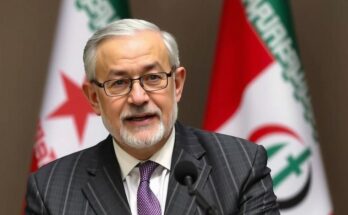South Sudan’s President Salva Kiir has dismissed long-serving intelligence chief Akol Koor Kuc, appointing close ally Akec Tong Aleu amid ongoing governmental challenges, including election delays. The NSS, known for its oppressive power, has faced scrutiny from human rights groups. Analysts interpret this leadership change as an effort by Kiir to consolidate power following a two-year extension of the transitional period, despite ongoing tensions with rival Riek Machar.
South Sudan’s President Salva Kiir has removed long-time intelligence chief Akol Koor Kuc, replacing him with a trusted associate, Akec Tong Aleu, as reported by state broadcaster SSBC through a presidential decree. This change follows the recent announcement from the transitional government regarding an additional two-year extension of the transition period and the postponement of elections for the second consecutive time, a decision that has sparked criticism from the United States and other international stakeholders invested in the peace process of South Sudan. Human rights organizations, including Amnesty International and Human Rights Watch, have consistently expressed concerns regarding the significant authority wielded by the National Security Service (NSS), particularly its actions against civil society and dissenters. Analysts suggest that the dismissal of Mr. Koor reflects ongoing power dynamics within the government, particularly regarding the President’s strategy to strengthen his base of loyal supporters amidst the extended peace agreement negotiations. The challenges of completing the peace process, following the cessation of civil conflict in 2018, remain significant due to ongoing tensions between President Kiir and his rival, Riek Machar.
This article discusses a significant political event in South Sudan, where President Salva Kiir has dismissed the long-serving head of the country’s intelligence apparatus, Akol Koor Kuc. The context involves recent turmoil within the transitional government, which has faced criticism for delaying elections that are pivotal for the country’s democratic future. The internal security dynamics are fraught with challenges, as the NSS, under previous leadership, was criticized for its oppressive tactics against those opposing the government. Kiir’s move is viewed within the broader framework of political maneuvering as the country seeks to stabilize after years of civil war.
In summary, the dismissal of Akol Koor Kuc as the intelligence chief and his replacement with Akec Tong Aleu signifies a strategic shift in President Salva Kiir’s administration amid mounting challenges surrounding electoral processes and internal security issues. This decision not only highlights the ongoing power struggles within the South Sudanese government but also reflects the complexities of the peace process and the broader implications for governance and human rights in the country.
Original Source: www.usnews.com




